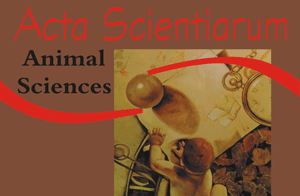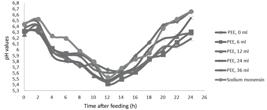This study evaluated the effects of different concentrations of 30% propolis ethanol extract (PEE) and sodium monensin on the intake of dry matter, nutrient digestibility and ruminal fermentation and hematological parameters in sheep. Six adult castrated male sheep fistulated in the rumen were assigned to a 6 x 6 Latin square design. The addition of PEE or sodium monensin to the diet did not change the digestibility coefficients of dry matter (79.4%), crude protein (77.0%), neutral detergent fiber (76.1%), acid detergent fiber (69.7%), hemicellulose (80.9%), and organic matter (79.4%). Sheep fed diets with inclusion of sodium monensin showed 11.3% reduction in dry matter intake (1.76 kg day-1) compared to those which received PEE (2.00 kg day-1). The inclusion of additives to the diet influenced ruminal pH: higher values were observed in sheep fed sodium monensin (6.1). Mean levels of ammonia nitrogen (7.3 mg dL-1) were similar between treatments. Biochemical serum parameters of glucose (59.4 mg dL-1), urea (8.9 mg dL-1) total protein (6.8 g dL-1) and albumin (2.5 g dL-1) were within the reference range for the ovine species. Sodium monensin was more efficient to maintain ruminal pH at higher levels and to reduce the dry matter intake. However, the addition of PEE did not affect the nutrient digestibility in sheep fed 50:50 forage: concentrate ratio.
nutrition; ionophores; bacteria; rumen; sheep blood

 Thumbnail
Thumbnail
 Thumbnail
Thumbnail






